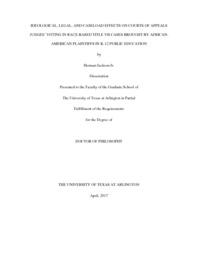
ATTENTION: The works hosted here are being migrated to a new repository that will consolidate resources, improve discoverability, and better show UTA's research impact on the global community. We will update authors as the migration progresses. Please see MavMatrix for more information.
Show simple item record
| dc.contributor.advisor | Wasserman, Lewis M | |
| dc.creator | Jackson, Herman | |
| dc.date.accessioned | 2023-09-11T15:09:48Z | |
| dc.date.available | 2023-09-11T15:09:48Z | |
| dc.date.created | 2017-05 | |
| dc.date.submitted | May 2017 | |
| dc.identifier.uri | http://hdl.handle.net/10106/31681 | |
| dc.description.abstract | This study investigated how effectively U.S. Courts of Appeals judges’(1) political ideology, as measured by party of the appointing president or judges’ DW-nominate scores; (2) legal developments, as measured by the 1991 Amendments to Title VII of the Civil Rights Act of 1964; (3) judicial caseload carried by courts of appeals three-judge panels; and (4) plaintiffs’ gender predict liberal-pro-employee and conservative-pro-employer voting in K-12 Title VII racial discrimination cases brought by African-American plaintiffs decided between 1964 and 2015. The study used logistic regression as its primary statistical tool.
The principal findings for this group of K-12 decisions are: (1) political ideology as measured by party-of-the-appointing president and DW-Nominate scores does not effectively predict court of appeals judges’ voting when all other variables are held constant; (2) changes brought about by the 1991 Title VII amendments brought about a substantial reduction in pro-plaintiff voting compared to the pre-1991 period when all other variables are held constant, irrespective of whether the P-A-P or the DW-Nominate measures were used in the model; (3) judicial caseload was not a significant predictor of judicial voting when all other variables are held constant; and (4) plaintiffs gender was not a significant predictor of judicial voting within these regression models.
It was suggested that the strong reduction in liberal-pro-plaintiff voting after the 1991 amendments were brought about by incentives provided by the combination of compensatory and punitive damages and attorney’s fee awards becoming available after the amendments: these appeared to be brought about a marked increase in meritless claims due to those incentives during the post-1991 period. Possible effects of the amendments on the ideological measures were considered as well. | |
| dc.format.mimetype | application/pdf | |
| dc.language.iso | en_US | |
| dc.subject | African-American, Public Education K-12 | |
| dc.title | IDEOLOGICAL, LEGAL, AND CASELOAD EFFECTS ON COURTS OF APPEALS JUDGES’ VOTING IN RACE-BASED TITLE VII CASES BROUGHT BY AFRICAN-AMERICAN PLAINTIFFS IN K-12 PUBLIC EDUCATION | |
| dc.type | Thesis | |
| dc.date.updated | 2023-09-11T15:09:48Z | |
| thesis.degree.department | Educational Leadership and Policy Studies | |
| thesis.degree.grantor | The University of Texas at Arlington | |
| thesis.degree.level | Doctoral | |
| thesis.degree.name | Doctor of Philosophy in Educational Leadership and Policy Studies | |
| dc.type.material | text | |
| dc.creator.orcid | 0000-0001-9880-0580 | |
Files in this item
- Name:
- JACKSON-DISSERTATION-2017.pdf
- Size:
- 1.374Mb
- Format:
- PDF
This item appears in the following Collection(s)
Show simple item record


